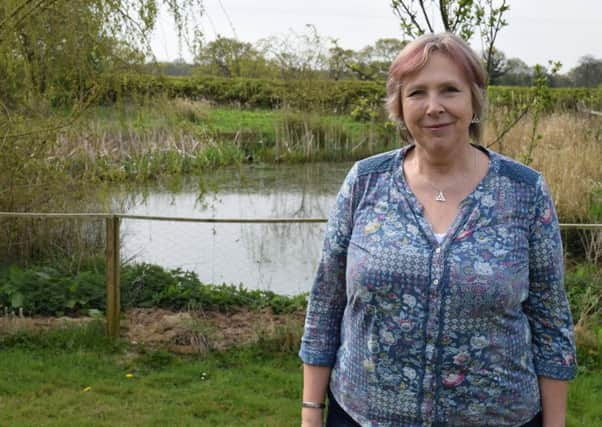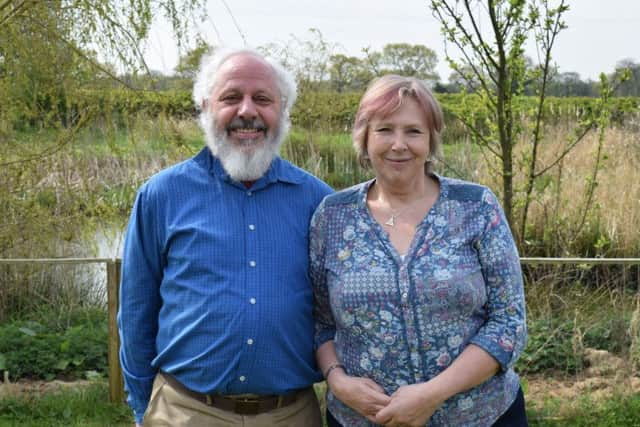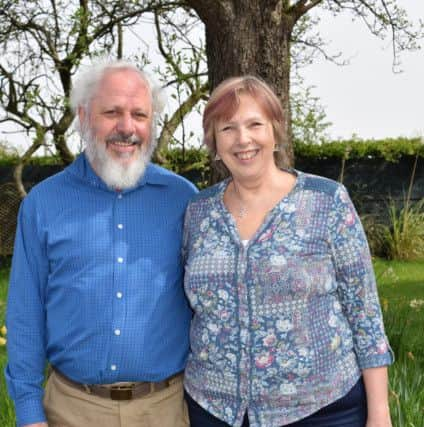'Talking about death won't make it happen any faster'


“Talking about death doesn’t mean it will happen any faster – it just means your family will know what you want at the end of your life.”
Jan Pillinger sums up the importance of speaking to loved ones about your final days and how you want to be remembered.
Advertisement
Hide AdAdvertisement
Hide AdJan, 60, who lives on Euxton Lane, Euxton, was diagnosed with breast cancer three years ago, which has now spread to her lungs, liver and hip.


Jan, a Methodist minister who is married to fellow minister Pete, was referred to St Catherine’s Hospice after going to hospital with an infection in October to receive advice on symptom control.
The mum-of-three is encouraging people to open up about end-of-life plans.
Jan explains: “There is a fear about talking about dying in our society, but I think it’s really important that people have the confidence to speak with their families about what they want towards the end.
Advertisement
Hide AdAdvertisement
Hide Ad“I’ve made a plan with my husband Pete and I want to go through it all with my sons and daughter so that everyone is on board. It’s helpful for the family to have it written down clearly so that they all understand my wishes and there’s no confusion.


“I know I want to die at home if possible and I’d like to be buried or cremated at the start of the funeral, followed by a celebration of my life held at church afterwards.
“I was going to have a cremation originally because, as a Christian, I don’t feel that personally I need a place to go to remember someone – there are memories at home and in photographs. But then I thought about what might be best for my family and I want to talk to them about possibly having a woodland burial, so that there’s somewhere for them to go to remember me.
“I did find it difficult at first thinking about my end-of-life plans, but in a way I’m able to distance myself from it, especially regarding the practical plans such as funeral arrangements. When I start talking about my children and grandchildren, it’s very hard to think about how all of this is affecting them.
Advertisement
Hide AdAdvertisement
Hide Ad“In a way it’s easier for me to talk about it because I won’t be here for all of it. I’ve got my faith, too, which really helps, but it upsets me to think about leaving my family and friends behind.”


Although the conversations are tough and emotional, Jan is determined to raise awareness about the importance of sharing end-of-life wishes with loved ones and health professionals.
Jan’s consultant in palliative medicine, Dr Claire Capewell, helped her and Pete to make a start on the difficult conversations, by presenting them with a guideline used by St Catherine’s Hospice.
The template offers advice on what topics to discuss and assisted Jan and Pete, 62, to develop their own plan.
Advertisement
Hide AdAdvertisement
Hide AdShe says: “We’re both Methodist ministers so we’ve been with people when they’re dying, but of course we haven’t been involved in making these kind of decisions before and considering the medical side of things.”


The couple, who oversee 17 churches and have pastoral charge for three – all in Wigan – say the support they received from St Catherine’s has been a lifeline at a very poignant time.
Jan, a grandmother-of-five, says: “I knew of St Catherine’s but didn’t realise the amount of care the charity provides. I thought people just went there for their final days, but going to the hospice has been one of the best things that could have happened for me.
“Day Therapy was great because it gave me the chance to speak to other people living with cancer about their experiences and feelings – but there was also lots of laughter and fun.
Advertisement
Hide AdAdvertisement
Hide Ad“When I was diagnosed three years ago, the average life expectancy for my cancer was between 18 months and two years. I kept asking if I would see Christmas, then the birth of my grandchild in February and then my 60th birthday this month and my oncologist kept saying it was a possibility. I think I’m still in the ‘months to live’ category, but you just don’t know. The palliative care and Day Therapy I’ve received at St Catherine’s has been so crucial to improving my quality of life.”
Pete says: “Going to St Catherine’s Hospice has been the biggest single contribution in this whole process, from the pain relief medication to the therapy and opening up the discussions about Jan’s end-of-life wishes.
“Our society hides away from death but I think talking about it more would create much healthier attitudes towards the issues.
“It is something we should all be thinking about and discussing, so we can all hope to die well when the time comes.”
Advertisement
Hide AdAdvertisement
Hide AdDR CLAIRE CAPEWELL CONSULTANT IN PALLIATIVE MEDICINE WHO WORKS CLOSELY WITH ST CATHERINE’S HOSPICE
“We want to help people discuss what’s important to them with their families as well as with professionals such as their GP or district nurse or people like me who specialise in palliative care.
“We refer to it as ‘advance care planning’ which includes subjects such as the individual’s concerns as they approach end-of-life, their values or personal goals for care, their understanding about their illness and prognosis, as well as particular preferences for types of care or treatment that may be beneficial in the future.
“Some people like to make detailed plans and others aren’t ready to talk about the end of life at all. There’s no right or wrong way to go about it. Often the role of the professional is simply to ‘kick start’ the process and families will continue the conversations in their own way and at their own pace.
Advertisement
Hide AdAdvertisement
Hide Ad“The most important thing is to discover more about each person’s wishes, such as where they would prefer to spend their final days and how they would like to be remembered.
“Planning for end-of-life is understandably a daunting experience. But when patients speak to us and their families and friends about what’s important to them and their wishes for the future, it can feel like a burden has been lifted. We encourage people to document what they want. Getting to know our patients as individuals is important to us and we are always happy to talk to people about these matters, individually or with loved ones. It’s good to talk!”
TONY BONSER
ST CATHERINE’S HOSPICE TRUSTEE AND NORTH WEST LOCAL CHAMPION FOR THE DYING MATTERS COALITION
“When my son Neil died from sarcoma in 2009, aged 35, the main problem for us was lack of communication.
Advertisement
Hide AdAdvertisement
Hide Ad“He had been diagnosed in 2004 and nobody ever actually said that he was going to die.
“The GP dropped hints, but we were in denial, so hints weren’t enough.
“Even now we have no idea if Neil even knew himself that he was going to die – the day he died, he told us that he would beat it.
“We learnt afterwards that they’d decided they wouldn’t resuscitate him if he had a heart attack, but they never discussed that with us and we don’t know if Neil knew either.
Advertisement
Hide AdAdvertisement
Hide Ad“We feel like we spent the last six months of his life chasing cures rather than enjoying family life.
“Nowadays, I go to medical conferences and speak about our experiences and advise on how to improve communications between medical professionals, patients and their families.
“I’m campaigning to spread the message that it’s okay to plan ahead and let people know what you want at the end of life.
“I think attitudes are changing slowly.
“It seems that people are keen to talk about these issues because they recognise how important it is and for those who do make end-of-life plans, people pay a lot of attention to that and take it very seriously.”